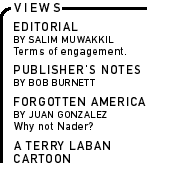 
|

|

|

|
| |
|
|
|
The Selling of Free Trade: NAFTA, Washington and the Subversion
of American Democracy Mollie's Job: A Story of Life and Work on the Global Assembly
Line In the happy-talk version of the new global economy, rich nations like the United States slough off bad jobs to poor nations like Mexico. This opens new opportunities for the impoverished people of the world to lift themselves up and for workers in the rich countries to find more skilled and rewarding work. Everybody wins. Unfortunately, that's not the way the world really works. Two recent books, each following a job from a factory that was closing in the United States to its relocation in a new border-zone maquiladora in Mexico, vividly show how workers and their communities lose on both ends of the transfer, while the owners of business win. Confronted with this unhappy version of globalization, many commentators--and even a few workers in these tales--shrug and say it's sad but inevitable. Yet these two accounts illustrate that this mutually destructive job exodus is not a fact of nature, but a function of how the rules of the game are written. These rules encourage a concentrated, absentee corporate control of economic activity that brutally ignores the welfare of workers and communities. They also encourage the export of capital in search of lower wages and powerless employees. Indeed, the heart of Harper's Magazine publisher John R. MacArthur's book, The Selling of Free Trade, is the sordid tale of how President Bill Clinton, with the able assistance of Al Gore, rammed a deal through Congress to encourage investment that undermines the jobs and well-being of people like Mollie James and Gorica Kostrevski. James is an African-American woman who moved north in 1950 from Virginia to make ballasts for fluorescent lights at a Universal Manufacturing factory in Paterson, New Jersey--an early industrial center that journalist William Adler uses in Mollie's Job to quickly frame two centuries of U.S. economic history. Kostrevski, the exemplary figure in MacArthur's book, is a Yugoslavian immigrant who worked at a Swingline staple factory in Long Island City, New York. Both lost their jobs as their companies moved to Mexico, with intermediate stops in Mississippi and Arkansas in Mollie's case. Yet Maria del Refugio Hernandez, who started work in a factory on the U.S.-Mexican border at age 15 and eventually took over Kostrevski's job at Swingline, and Balbina Duque Granados, who assumed Mollie's job after migrating to Matamoros, were not prospering. They were living in crowded and miserable colonies of makeshift shacks and earning barely enough to survive, less in real terms than the textile mill workers of Paterson who conducted an epochal strike in 1913. Those Paterson workers had struck because their employers had cut pay and sped up work, "ostensibly so the mills could remain competitive with those in states with lower wages and weaker labor laws," Adler writes, but the competition came from plants that the mill owners had built in rural areas of Pennsylvania, where they could pay half of the prevailing Paterson wage. Now companies move across national, rather than state, borders, but "globalization" is not some new, liberating phenomenon. It is a continuation of an old dynamic of capitalism played out on a grander scale. In both of these books, scrappy entrepreneurs built medium-sized companies to prominent positions in their markets, then were bought out by large, diversified corporations that eventually shut down unionized factories that paid decent but still modest wages. Although the original owners were more anchored in their communities and had paternalistic ties to workers, they were hardly generous toward labor. They happily collaborated with corrupt unions that workers fought, with mixed results, to get better representation and contracts. In both cases, modest surges in union militancy triggered planning to move production and avoid unionization. Universal's founder opened a plant in Mississippi to avoid his union: It was nevertheless unionized after a massive, ugly anti-union campaign. But both companies became more hostile to unionization and more inclined to move to Mexico as ownership changed hands to corporate executives who were much more focused on maximizing financial returns from their firm's many different operations than on the nitty-gritty of the shop or the provision of customer service. The shift of jobs to Mexico's northern border started in the mid-'60s, when Mexico and the United States changed their laws to make it possible for U.S. companies to export materials for processing to border factories, then pay a tariff on only the miniscule value added by low-wage Mexican labor. By 1990, as MacArthur recounts, the heavily indebted Mexican government was desperate for foreign capital, and U.S. businesses were more than interested in building factories in Mexico. "The only rational reason for an American company to decline Mexico's standing invitation to exploit its low-cost labor environment (and easily polluted natural environment)," MacArthur writes, "was the concern that angry Mexicans ... would rise up and seize American assets" as they did in 1938. Thus NAFTA was born, more as an investment agreement than a trade agreement. While it established strong protections against nationalization, NAFTA also opened up opportunities for investment throughout the Mexican economy, protected intellectual property claims and locked the Mexican government into maintaining a sympathetic climate for foreign businesses. Ultimately, however, the Mexicans resisted U.S. demands to open investment in the oil industry, and the United States refused Mexico's request to open up the borders to the movement of workers. When President George Bush proposed NAFTA, the business establishment did not immediately embrace the idea with enthusiasm. Beyond their traditional divisions over free trade, many business leaders worried about Bush's suggestion that the agreement could deal with labor rights and the environment. While there were significant Democratic misgivings, Congress greased the way for NAFTA by approving the fast-track presidential negotiating authority--and MacArthur is especially critical of then House Majority Leader Richard Gephardt, often a leading critic of unfair trade, for failing to fight vigorously against fast-track. Politically hobbled by the still sluggish economy in 1992, Bush tried to use progress on NAFTA negotiations as proof that he was creating new jobs. Clinton could not repudiate Bush's NAFTA deal, since he had campaigned in the primary as the free trade candidate. Citing Rep. David Bonior and others, MacArthur argues that Clinton was such a fervent advocate of trade liberalization because it helped his campaign raise money and aligned him with the country's powerful elite. But Clinton needed to mollify union members and other free trade skeptics. Presented by his staff with a strong option--to reject NAFTA until it had vigorous labor and environmental protection--and a weak alternative, Clinton embraced the strategy of supporting Bush's agreement but adding some modest labor and environmental provisions, thus making NAFTA less of an issue in the election. Yet once elected, Clinton had to sell NAFTA to a skeptical Congress. MacArthur details the development of this sales campaign, described by a key participant, advertising executive Leo Kelmenson, as "the most carefully manipulated program of public persuasion since Hitler." The Clinton White House worked intimately with the Business Roundtable, top Washington lobbyists and major corporations to sell NAFTA, even turning over White House polling data. Some business executives hesitated to help a Democratic president win a legislative battle, but Newt Gingrich angrily lectured them on the necessity of fighting hard for NAFTA. Other executives had assumed that, especially with fast-track provisions, NAFTA would sail through easily. But the opposition proved formidable. Both Democrats and Republicans were already divided, although Republicans in the House were more favorably disposed to NAFTA. But the emergence of Ross Perot, the opposition of organized labor and many big environmental groups, and the grassroots campaigns around the country made the sales job tougher, even with the help of stars like Lee Iacocca and Clinton (whom Kelmenson described as "the best advertising man in the world"). "George Bush could never have passed NAFTA," argues Mickey Kantor, Clinton's former trade representative. "No Republican President could have, because he couldn't have brought [along] enough Democrats." The NAFTA advocates had plenty of money: USA*NAFTA, the main business group, spent at least $10 million in two months, and the Mexican government paid Washington lobbyists at least $6.9 million. Besides the television ads, there were fake grassroots ("astroturf") groups for NAFTA, dubious academic studies and, in the final stretch, an orgy of special favors to win undecided members of Congress, including Clinton's pledge to go duck hunting with one member. Although Clinton did go hunting, many of the promises never materialized. For example, the highly touted North American Development Bank provided minuscule aid to clean up the border. One turning point was the debate between Al Gore and Ross Perot. The grassroots movement against NAFTA, including local union leaders, environmentalists, consumer advocates, farm groups, Public Citizen, Citizens Trade Campaign and others, was a more effective threat than Perot--although MacArthur does not give the movement proper credit. But Perot was big news, and the White House--especially Gore and his staff--wanted to identify the opposition to NAFTA with Perot, since he could be made to appear wacky or extreme. If Gore had debated Ralph Nader, for example, he might not have fared as well. But Gore rattled Perot. He also tossed in anecdotes about Mattel and a supposed "textile" manufacturer (actually a producer of chemicals for synthetic fibers) who would move operations after NAFTA's passage to create jobs in the United States. Neither anecdote was true, MacArthur argues, but Gore's "fibs" in the debate were not unusual for NAFTA advocates. Most of the dire consequences NAFTA proponents warned would happen if NAFTA were rejected actually occurred--after it passed. Most of the benefits have not been realized: The U.S. trade surplus turned into huge deficits; hundreds of thousands of U.S. jobs have been shifted to Mexico; the peso crashed (partly an inevitable aftermath of the Mexican government's politically motivated efforts to inflate its value before the NAFTA vote); and most of the modest wage gains since then have been eaten up by inflation. Despite similarity with MacArthur's book, Adler attempts to paint a broader-brush history of the American economy over the past century, giving the NAFTA debate only a brief summary. While recounting the rise of Universal Manufacturing and its transformation into part of MagneTek, a 1986 spin-off from the Litton conglomerate, he weaves in the story of Paterson, a discussion on race relations, a history of the Teamsters, an account of General Electric's efforts to block efficient fluorescent lighting technology, and the formation of economic development policies in both the South and Mexico. These digressions illuminate broader trends but also distract from Adler's strong narrative about Mollie James' job. The strength of Adler's book is not in its analysis or new revelations about globalization but in the very particular illustration of how a job moves--from Paterson to Simpson County, Mississippi and on to Matamoros, Mexico. The law eased the move: It limited what workers could do to restrain capital mobility, and subsidized the move with both outright tax breaks and less direct financial aid (from right-to-work laws in the South to corrupt and phony unions in Mexico). At one point, the U.S. government even encouraged businesses to relocate to Mexican maquiladoras. In Matamoros, Balbina Duque explains how her paycheck doesn't go far enough to cover her meager expenses, but she's also aware that unions in Matamoros occasionally have been more demanding than in other border towns, like Reynosa, where MagneTek opened a new plant two years ago. Adler asks if she would follow her job--originally Mollie's job--to Reynosa, if the company moved it there. "And what if they were to move again?" she replies. "Maybe to Juarez or Tijuana? What then? Do I chase my job all over the world?" MacArthur's narrative ends on a similarly poignant note as he returns to the closed Swingline factory in Long Island City, then occupied by a few businesses that paid much less than Swingline did. Sitting in a nearby diner, he is approached by a young immigrant Ecuadorian woman, looking for a job. As businesses flee workers who try to raise their standards of living, workers elsewhere abandon their homes and communities in search of those mobile jobs, creating an economic rat race that suppresses the aspirations of workers everywhere. Neither Adler nor MacArthur offer solutions, other than presumably
not passing investment agreements like NAFTA. But they do a great
service by showing in a direct and visceral way how political decisions
intensify the toll of globalization on women like Mollie and Balbina,
or Gorica and Maria. Outside the Panglossian realm of trade theory,
the story of the new global economy is often not very happy at all.
|

